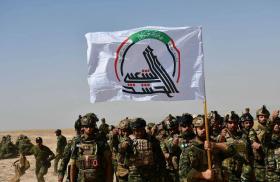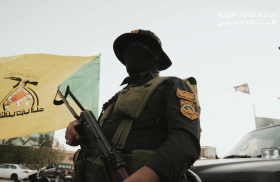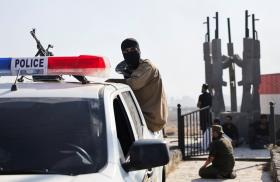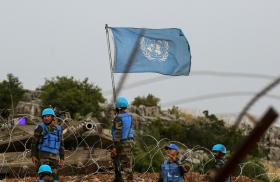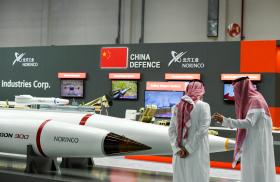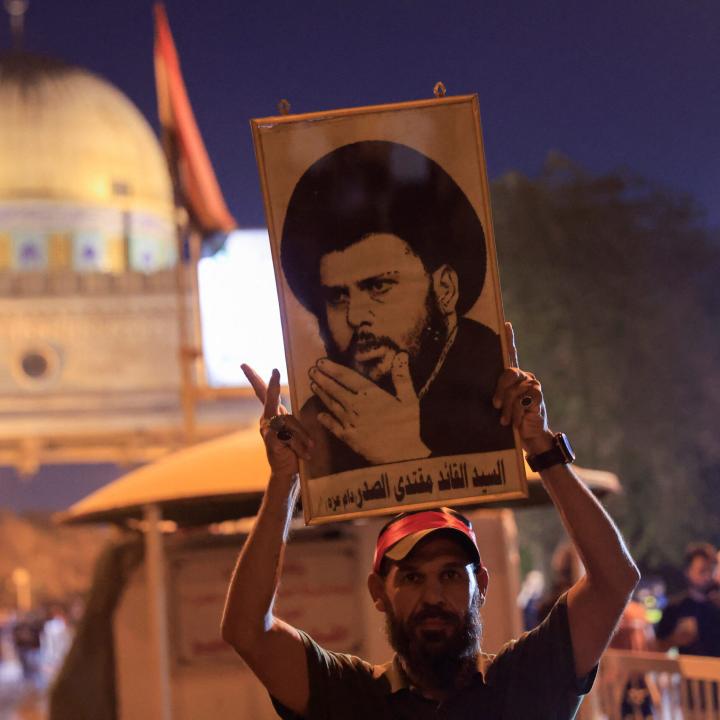
Game On: Sadr and the Iraqi "Resistance" Clash Over State Control of Arms

A prevalent theme in this year's election could be the need to bring militia arms under control, and the latest back-and-forth on the issue nearly led to major fighting in Baghdad.
On June 26, Abdul Mahdi al-Karbalai, the official representative of leading Shia cleric Grand Ayatollah Ali al-Sistani, delivered a sermon in Karbala calling for fundamental reform and the enforcement of state authority in Iraq. Karbalai emphasized that the country’s future depends on implementing a national governance framework rooted in integrity and institutional legitimacy. Referencing "the Supreme Religious Authority"—meaning Sistani—the sermon called for Iraqi elites to stand up to external interference in all its forms, uphold the rule of law, limit arms to state authorities, and combat corruption at all levels. Karbalai's comments were widely interpreted as an implicit critique of the self-styled muqawama (resistance), the collection of Iran-backed militias that operate outside the state's control despite avowedly being under the prime minister's command.
On July 4, Shia leader Muqtada al-Sadr echoed and amplified this position, issuing a pointed statement that directly called for disbanding the militias and disarming nonstate actors: "Falsehood shall not be repelled except by handing over uncontrolled weapons to the state, dissolving the militias, strengthening the army and police, and ensuring Iraq’s independence, without following the corrupt, and striving earnestly for reform and holding the corrupt accountable.”
The "Resistance" Lashes Out
Sadr’s remarks sparked immediate backlash from key figures in the muqawama. On July 5, an infamous Telegram account under the name Abu Ali al-Askari—the handle used by an as-yet-unidentified (though see below) senior spokesman for the U.S.-designated terrorist militia Kataib Hezbollah (KH)—issued a blistering rebuttal condemning the calls for disarmament as a betrayal: “To call for handing over the resistance’s weapons at a time when the cries of the Zionist-American criminals grow louder in the region is to betray the blood of the martyrs." The post then escalated with a thinly veiled insult directed at Sadr: “The most disgraceful thing is that honorable free men would hear the vile talkers speaking of dignity and honor, while the lowly of this world—cowards and sissy-men—decide what should happen to the weapons of the resistance” (Figure 1).
On July 10, Hossein Moanes—secretary-general of the Hoquq Movement, a political party linked to KH—was interviewed on Al-Forat TV. Interestingly, many authorities believe that Moanes has been—and perhaps still is—the real person behind the Abu Ali al-Askari online personality. In the interview, Moanes bizarrely explained what "Askari" meant when using the inflammatory phrase “sissy men,” stating, “He meant those who create these crises...out of ignorance or intentionally because they are paid to bring up the weapons and disarm Shia from their claws.” Here, Moanes was seemingly trying to distance KH from having made a homophobic slur against Sadr himself—a very dangerous thing to do.
Asaib Teases Sadr
On July 16, Ali Turki—a member of parliament and mouthy commentator for the terrorist militia Asaib Ahl al-Haq (AAH)—put out a statement joining KH's pushback against the calls to restrict weapons. Indirectly addressing Sadr, he warned: "Your voice is merely an echo, while the voice of the religious authority is the origin. Do not rush lest you perish, for you will change nothing." He then declared that the Popular Mobilization Forces (PMF) "will remain until the appearance of the Mahdi" (Figure 2). This statement shows AAH trying to appear as though it is aligned with Sistani but still a hardline faction opposed to Sadr. The "echo" comment was clearly directed at Sadr, framing his statement on PMF dismantlement as a weak replay of Sistani's words.
Looking toward the November's election, this public exchange reflects intensifying tensions between the Marjaiya—the mainstream nationalist militia forces led by Sadr—and the Iran-backed "resistance." The core issue remains the future of nonstate armed groups and their place in Iraq’s security landscape, especially amid growing calls for asserting the state’s monopoly over the use of force. The muqawama factions risked a major armed clash with Sadr by publicly insulting him: his allied fighters in the group Saraya al-Salam were reportedly close to mounting a punitive raid into the KH stronghold of Palestine Street in the hours after the Abu Ali al-Askari statement, but they were held back due to the religious importance of the ongoing Muharram celebrations. Next time, as temperatures and tensions rise and Muharram passes, there may be no holding back those looking for a fight.
